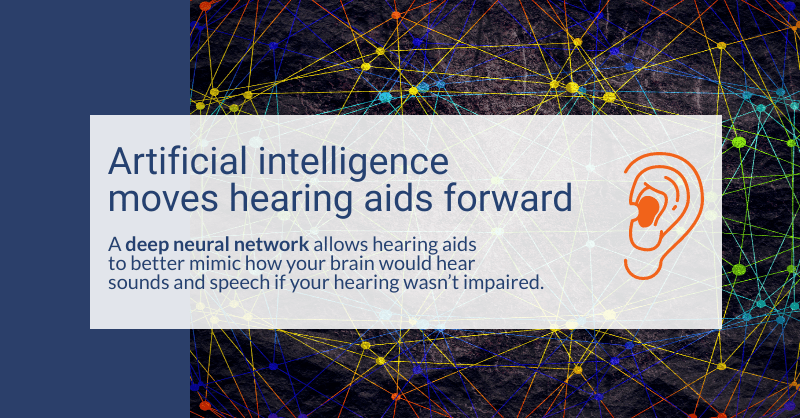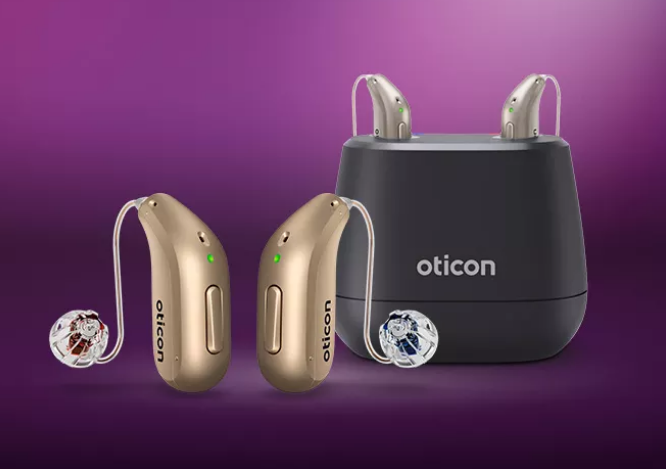Key points:
-
Artificial intelligence (AI) is now widely used in hearing aids to help users better understand speech and suppress unwanted background noise, improving hearing ability in noisy environments.
-
Hearing aids with AI also reduce listening fatigue by adapting to sounds automatically, making it easier to focus on conversations without extra effort.
-
Talk to a qualified hearing healthcare provider to learn more about whether AI hearing aids are right for you or your loved ones.
The topic of artificial intelligence (AI) is often the subject of much debate. However, when it comes to your hearing aids, there's no question AI helps the devices enhance user's listening experience.
As time goes on, researchers are finding more ways to harness this technology and use it to improve hearing aids. Here’s what you need to know about how hearing aids use AI—and if a hearing aid with this functionality is right for you or a loved one.

How hearing aids use AI
Hearing aid technology has come a long way since their simple beginnings. Scott Young, Aud, CCC-A, owner of Hearing Solution Centers, Inc. in Tulsa, Okla. notes a significant change began when hearing aids introduced a technology known as wide dynamic range compression (WDRC). This is when hearing aids actually began to make a few decisions based on what it heard.

“Over the last several years, AI has come even further—it actually listens to what the environment does,” Scott says. And, it responds accordingly. Essentially, a neural network like AI allows hearing aids to begin to mimic how your brain would hear sound if your hearing wasn’t impaired.
What are the benefits of using an AI hearing aid?
1. Better hearing in noisy environments
One of the biggest struggles people with hearing loss face is the ability to hear conversations in a loud, busy place such as a restaurant or a cafe, even when using hearing aids. However, hearing aids using AI can make this problem much easier to manage in several ways.
AI hearing aids use advanced algorithms to help identify and suppress unwanted background noise. The technology can also locate the direction of speech and amplify the volume of the voices of people you are talking to, making it easier to hold conversations in louder environments.
The technology can adapt and make changes in real time, constantly working to help you hear the sounds and voices you want to pick up most. Some models have the ability to learn your listening preferences over time, tailoring their settings automatically for different environments (like "restaurant mode").
2. Listening effort is reduced
Another benefit of AI hearing aids is reduced listening fatigue from hearing loss. While any hearing aid can help with this problem, the fact that AI hearing aids are automatically adjusting and learning to provide an optimal listening experience means that AI helps people spend less time trying to make sense of the noise around them, a process known as "listening effort."
When the listening effort is more natural, a person can focus more on the conversation and all the nuances conveyed within.
3. Other benefits
Some other features of hearing aids with AI technology include, but are not limited to:
- Fitness and cardiac tracking capabilities, such as counting steps, heart rate and other vital signs
- Fall detection that can automatically alert emergency services if a fall is detected
- Live transcriptions and translations of conversations when used with a corresponding hearing aid app
- Suppression of sudden, loud noises (like a car door slamming) and hearing aid feedback (whistling in your device) before it happens
- Remote reading and adjustments from your hearing specialist, saving you a trip to the office
What are the best AI hearing aids?
These days, most major hearing aid manufacturers hearing aid models with AI technology. What's best is largely a personal preference.

For example, the Oticon Intent™ comes with the capability to actually understand a user's listening intentions and can work with all degrees of hearing loss from mild to profound. Manufacturers like Phonak, Starkey, Widex and Signia also use AI technology in their premium hearing aids.
Do I need a hearing aid with AI?
Whether or not AI-powered hearing aids are right for you is a personal decision dependent on many factors. They can be a good fit for people who lead active lifestyles or often find themselves in noisy environments.
They are also great for tech-savvy users who want the advanced features these devices are equipped with to improve their listening experience.
Some patients may not need all the features. If you mostly need basic sound amplification and spend the majority of your time in quieter settings, a simpler hearing aid might meet your needs. It's also important to note that, in general, AI hearing aid prices can be higher than more basic models, so it’s important to choose the option that fits your lifestyle and budget.
The first step towards figuring out what hearing aid is best for you is to make an appointment with a qualified hearing specialist in your area to discuss your options and find your ideal fit.
The above is the interpretation of How AI is Revolutionizing Hearing Aid Technology provided by Chinese hearing aid supplier Shenrui Medical. Link https://www.srmcm.com/Blog/How_AI_is_Revolutionizing_Hearing_Aid_Technology.html of this article is welcome to share and forward. For more hearing aid related information, please visit Blog or take a look at our Hearing aids products















